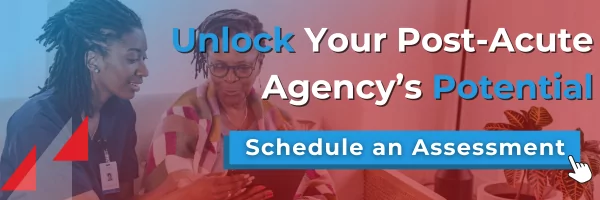Understanding the RX Ordering Process in Post-Acute Care

Author: Cole Sorensen
Posted: September 24, 2024
Evaluate the Effectiveness of Your Post-Acute Agency [Schedule an Assessment]
Nurses play a pivotal role in providing direct patient care and managing medications effectively in home health and hospice care. Exploring the essential steps and considerations involved in the prescription ordering process in post-acute care is crucial, with the goal of emphasizing the nurse's responsibilities and strategies for optimizing patient outcomes. The process of ordering prescription RX in the post-acute space is complex and needs to be assessed and optimized to save clinician time and significantly improve patient outcomes and efficiency.
Introduction to Nurse’s Roles in Medication Management
In home health and hospice care, nurses play a pivotal role in ensuring that patients receive appropriate medications tailored to their specific needs. This involves a series of critical steps from patient assessment to medication administration, all aimed at enhancing comfort, managing symptoms, and supporting quality of life. Through a comprehensive treatment plan, nurses must ensure the needs of the patient are met and exceeded, involving ordering the proper medications and doses specific to the needs at the time of care. Medication management is crucial for nurses to maintain patient safety and to prevent any medication errors that could harm a patient. To ensure this safety, nurses must remain compliant while conducting comprehensive patient assessments and informing care plans.
Patient Assessment and RX Ordering Process
Central to effective medication management is comprehensive and compliant patient assessments. Under CMS regulatory guidelines, medication management requirements include nurses not only evaluating the medical condition but also the patient’s symptoms, preferences, and overall care goals.1 Understanding these factors helps nurses make informed decisions regarding medication choices, dosages, and administration schedules that align with the patient’s individual needs.
To start the RX ordering process, a nurse would first need to do a medical history review of the patient to understand their past and medical conditions, allergies, previous medications, and any other underlying variables. A physical assessment and symptom evaluation is needed to determine a patient’s current physical condition and vitals to consider the appropriate treatment. After evaluating those factors, it is important for nurses to gather their patient’s input and concerns about their medical situation to get a good sense of what the patient wants to achieve from taking their medicine.
Along with working with the patient, it is important for nurses to be in collaboration with their healthcare team members to ensure a comprehensive evaluation of the patient is correctly assessed and the right decisions are made. Finally, once a medication is established to be prescribed, proper education about the prescribed medications including dosage, administration instructions, potential side effects, and expected outcomes is necessary on a nurse’s behalf to ensure correct usage occurs. Throughout prescribing and delivering care, open communication and transparency remains a leading practice for success of all parties involved.
The Role of Communication and Education
Clear and effective communication is vital when continually conveying medication orders to patients and their caregivers. Nurses must ensure that instructions are continuously understood, emphasizing proper administration techniques and potential side effects to monitor. This education empowers patients and caregivers to manage medications confidently at home, promoting adherence and safety.
Furthermore, ongoing communication fosters a supportive relationship where patients feel comfortable expressing concerns or asking questions about their medications, ensuring they remain actively engaged in their care.
Documentation and Patient Monitoring
Accurate documentation is a crucial step in ensuring compliance in the RX ordering process Nurses meticulously record medication orders, dosages, and administration instructions in patient records. This documentation not only serves as a legal record but also facilitates continuity of care by providing a clear history of medications prescribed and administered. Extensive documentation ensures not only regulatory compliance is met and kept, but the evolving needs of the patient are continually monitored and dealt with properly. Tight documentation practices uphold compliance while ensuring comprehensive and clear care is available for the patient regardless of their needs.
Along with documentation, monitoring the effectiveness of prescribed medications is a continual process to ensure the proper care plan is in effect. Nurses regularly assess patient responses, monitor for adverse reactions, and adjust medication regimens as needed. This proactive approach helps optimize symptom management and enhances overall quality of life.
How MHA Can Streamline Your Agency's RX Ordering Process
By working closely with home health and hospice agencies and leveraging our expertise, MHA ensures that operations and processes are tailored to meet each individual patient’s needs effectively. Through tech-enabled services that help streamline documentation and comprehensive operational assessments, MHA provides the necessary guidance to help agencies maximize their compliance and efficiency while providing leading care to patients.
For agencies navigating the complexities of medication management, MHA offers valuable support and resources. Whether it’s guidance on regulatory requirements or technology for implementing efficient documentation systems, MHA brings the expertise needed to streamline processes and enhance patient care outcomes.
With MHA’s help, agencies can benefit from extensive strategic knowledge and commitment to excellence in home health and hospice care. To learn more, contact us at [email protected], or visit www.maxwellhca.com. Together, agencies can navigate the post-acute industry with confidence, ensuring that patients receive the highest standard of care tailored to their unique needs.
Resources:
- U.S. Centers for Medicare and Medicaid Services. R77SOMA.pdf. Accessed June 26, 2024. https://www.cms.gov/regulations-and-guidance/guidance/transmittals/downloads/r77soma.pdf.

